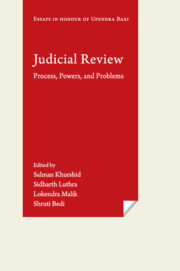Book contents
- Frontmatter
- Contents
- Foreword
- Editors' Note
- Introduction
- 1 The Inadequacy of Judicial Enforcement of Constitutional Rights Provisions to Rectify Economic Inequality, and the Inevitability of the Attempt
- 2 The Interplay of Law and Politics in India
- 3 Beating the Backlog: Reforms in Administration of Justice in India
- 4 Judicial Review: Perspectives and Reflections for the Twenty-First Century
- 5 When ‘Creeping Jurisdiction’ Goes Awry: The Social Action Litigation to Ban Surrogacy
- 6 Judicial Review and the Democratic Judge
- 7 Judicial Review: A Tool to Shape Constitutional Jurisprudence
- 8 The Baxian Bioscope on Indian Judicial Process
- 9 Judicial Activism, Courts, and Constitutional Revolutions: The Israeli Case
- 10 Democracy, Constitution, and Judicial Review: A Critique
- 11 A Minor Jurisprudence of Pathos: Upendra Baxi as Teacher and Writer
- 12 The Need for Reinventing the Supreme Court as a Constitutional Court
- 13 Appointment of ‘Distinguished Jurists’ as Judges in the Supreme Court of India: A Critical Analysis
- 14 Judicial Dissent and Judicial Review: A Functional Analysis
- 15 The Power of Judicial Review: Judicial Chutzpah or Judicial Desideratum
- 16 Judicial Review of Legislations by Tribunals in India: Law, Problems, and Perspectives
- 17 Criminalization of Membership of Terrorist Organizations in India and the United States of America: Human Rights Concerns
- 18 Article 142 of the Indian Constitution: On the Thin Line between Judicial Activism and Restraint
- 19 Sketching the Limits of Article 142 of the Constitution of India: A Constitutional Necessity
- 20 Constitutional Morality and Judges of the Supreme Court
- About the Contributors
- Index
14 - Judicial Dissent and Judicial Review: A Functional Analysis
Published online by Cambridge University Press: 23 January 2020
- Frontmatter
- Contents
- Foreword
- Editors' Note
- Introduction
- 1 The Inadequacy of Judicial Enforcement of Constitutional Rights Provisions to Rectify Economic Inequality, and the Inevitability of the Attempt
- 2 The Interplay of Law and Politics in India
- 3 Beating the Backlog: Reforms in Administration of Justice in India
- 4 Judicial Review: Perspectives and Reflections for the Twenty-First Century
- 5 When ‘Creeping Jurisdiction’ Goes Awry: The Social Action Litigation to Ban Surrogacy
- 6 Judicial Review and the Democratic Judge
- 7 Judicial Review: A Tool to Shape Constitutional Jurisprudence
- 8 The Baxian Bioscope on Indian Judicial Process
- 9 Judicial Activism, Courts, and Constitutional Revolutions: The Israeli Case
- 10 Democracy, Constitution, and Judicial Review: A Critique
- 11 A Minor Jurisprudence of Pathos: Upendra Baxi as Teacher and Writer
- 12 The Need for Reinventing the Supreme Court as a Constitutional Court
- 13 Appointment of ‘Distinguished Jurists’ as Judges in the Supreme Court of India: A Critical Analysis
- 14 Judicial Dissent and Judicial Review: A Functional Analysis
- 15 The Power of Judicial Review: Judicial Chutzpah or Judicial Desideratum
- 16 Judicial Review of Legislations by Tribunals in India: Law, Problems, and Perspectives
- 17 Criminalization of Membership of Terrorist Organizations in India and the United States of America: Human Rights Concerns
- 18 Article 142 of the Indian Constitution: On the Thin Line between Judicial Activism and Restraint
- 19 Sketching the Limits of Article 142 of the Constitution of India: A Constitutional Necessity
- 20 Constitutional Morality and Judges of the Supreme Court
- About the Contributors
- Index
Summary
Introduction
The proposition to establish a separate and distinct judicial wing of state equipped with power of judicial review, accountable for upholding the constitution as the supreme law of the land, is a unique American contribution to political theory. Indeed, it was a revolutionary idea in the late eighteenth century, especially when contrasted with the notion of parliamentary supremacy so familiar in Great Britain. Distant from a threat to popular will, a separate judicial wing was premeditated to pledge democratic freedoms by averting the concentration of power in government. It was vital in the system of separation of powers and checks and balances to ensure a delicate steadiness between the separated powers-holders. Interestingly, the term ‘judicial review’, like the word ‘democracy’, is conspicuously absent from the US Constitution. However, that the founders were familiar with the concept cannot be doubted. By the time American Constitution was drafted, eight of the thirteen states had incorporated judicial review into their own Constitutions, and more than half of the delegates to the Constitutional Convention supported it. Alexander Hamilton explained:
[T]he judiciary, from the nature of its functions, will always be the least dangerous branch…. The judiciary … has no influence over either the sword or the purse; no direction either of the strength or the wealth of the society, and can take no active resolution whatever. It may truly be said to have neither Force nor Will but merely judgment….
He argued for judicial review by an independent judiciary as a necessary means to void all governmental actions contrary to the Constitution. He maintained that limits placed on the power of the federal legislative and executive branches in order to protect the rights of individuals ‘can be preserved in practice no other way that through … courts of justice, whose duty it must be to declare all acts contrary to … the Constitution void’. Without this power of judicial review, Hamilton avowed, ‘all the reservations of particular rights or privileges would amount to nothing’. He concluded:
No legislative act, therefore, contrary to the Constitution can be valid…. [T]he interpretation of the laws is the proper and peculiar province of the courts. A constitution is … a fundamental law. It therefore belongs to [judges] to ascertain its meaning as well as the meaning of any particular act proceeding from the legislative body.
- Type
- Chapter
- Information
- Judicial Review , pp. 252 - 276Publisher: Cambridge University PressPrint publication year: 2020



